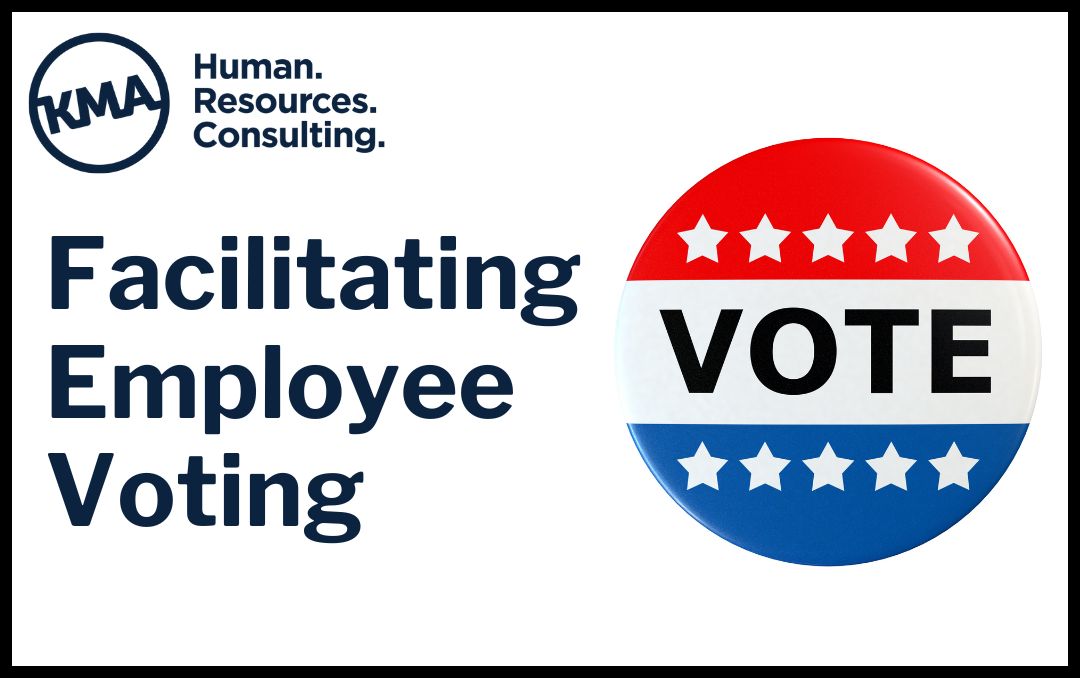By the KMA Team
 In our current socially conscious business environment, facilitating employee voting and encouraging civic engagement is not just good policy, it’s also a powerful way to build a positive organizational culture and enhance your employer brand. Companies that take steps to support their employees’ right to vote demonstrate a commitment to civic responsibility, which can resonate deeply with both employees and customers. This article will show why and how you can encourage voting participation.
In our current socially conscious business environment, facilitating employee voting and encouraging civic engagement is not just good policy, it’s also a powerful way to build a positive organizational culture and enhance your employer brand. Companies that take steps to support their employees’ right to vote demonstrate a commitment to civic responsibility, which can resonate deeply with both employees and customers. This article will show why and how you can encourage voting participation.
Why You Should Encourage Employee Voting
When companies encourage voting, they contribute to the broader societal good by promoting civic responsibility. Voting is a fundamental right and a cornerstone of democracy. By supporting this process, businesses show they value democratic participation, which can strengthen the social fabric of the communities they operate in.
A company that supports voting is often seen as a socially responsible and ethical organization. This positive perception can help you attract top talent, especially among younger generations who prioritize working for values-driven employers. Moreover, customers and clients may also be drawn to companies that exhibit a strong sense of social responsibility. It’s good for your employer brand.
Encouraging civic engagement can help build a more engaged workplace culture. Employees are likely to feel more connected and loyal to an organization that supports their ability to participate in civic duties. This sense of belonging and engagement can lead to higher job satisfaction and productivity.
How to Encourage Employee Voting
Make Election Day a Holiday. One of the most impactful ways a business can encourage voting is by designating Election Day as a paid company holiday. This approach eliminates the challenge of balancing work responsibilities with voting, ensuring that all employees have the time and opportunity to cast their ballots.
Offer Paid Time Off for Voting. If making Election Day a holiday is not feasible, offering paid time off specifically for voting is another option. This can be structured as a few hours or a half-day of paid leave, allowing employees the flexibility to vote before or after work, or during a break. This policy acknowledges the importance of voting while minimizing disruption to business operations.
Provide Voting Resources and Information. Educating employees about the voting process is another way to facilitate participation. Companies can share non-partisan resources that explain how to register to vote, where to vote, and what’s on the ballot. Providing this information can make the voting process more accessible, especially for first-time voters or those who may be uncertain about how to participate.
Organize Carpooling or Transportation. For employees who may face challenges getting to the polls, organizing carpooling or providing transportation to polling stations can be a practical solution. This is especially helpful in areas with limited public transportation or for employees without access to a vehicle.
Note that, while Maine does not mandate employers to provide time off for voting (paid or unpaid), some states require an employer to provide a certain amount of time unpaid, and many states mandate employers to pay upwards of 3 hours for an employee to vote. As always, refer to your home state labor laws for compliance guidance.
Facilitating employee voting is a meaningful way for businesses to support democracy, foster civic responsibility, and build a positive organizational culture. By implementing policies that make it easier for employees to vote, companies can enhance their employer brand and contribute to the well-being of their communities. In an era where corporate social responsibility is increasingly valued, encouraging voting is not just the right thing to do, it’s also a smart business strategy.
